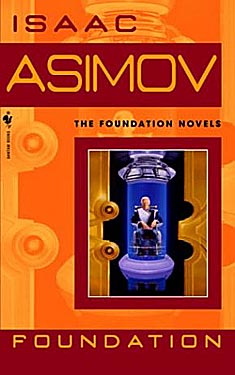Isaac Asimov
Completed 8/5/2020, Reviewed 8/5/2020
3 stars
Completed 8/5/2020, Reviewed 8/5/2020
3 stars
I first read
the first four Foundation books about six years ago. I didn’t write a review for the first three
because I read them in anticipation of the fourth, Foundation’s Edge, during my
Hugo winners reading marathon. But I did
give a brief summary of my thoughts of each book in my review of Edge. Back then, I liked the first four stories and
didn’t care for the fifth. (The first three books are collections of short
stories, novellas, and novelettes about the Foundation). This time, I didn’t care for the first three
stories, liked the fourth, and really liked the fifth. Overall, though, I found all five stories of
this book to be too overloaded with exposition.
It’s all “Well let me tell you how I did this” or “Let me tell you what
happened” rather than showing me through action. And granted, these stories were written in
the ‘40s, but, OMG, this book is about a bunch of cigar smoking privileged white
guys who control or try to control the future of the galaxy.
Hari Seldon
is a psychohistorian who through mathematics predicts that the galactic empire
is about to fall apart and be replaced by millennia of dark ages. In response, he creates a foundation whose
goal is to preserve all human knowledge, make it available to everyone, and in
effect reduce the coming dark ages to a single thousand years. Each story presents a crisis that if
successfully overcome as Seldon predicts through the science of psychohistory, the
galaxy comes closer to its goal of a renaissance within the thousand-year time
frame. The crises are religious,
political, and economic. Every crisis is
confronted head-on by some powerful individual man against all odds and the
forces of other powers that be.
As I
mentioned in the opening paragraph, my biggest problem is the exposition. Every story has long one-sided dialogues that
reveal how the Empire is falling apart and how the Foundation is surviving. Aside from this, the character development is
problematic. I found it to be quite
minimal. The characters are memorable
because of what they do, not who they are.
They have no backgrounds, few emotions, and no growth. I guess the point of the stories is not the
people characters, but the characters of the rising Foundation and the declining
Empire. Oh yeah, there is one female
character, the wife of one of the rulers of one of the planets in one of the
stories. She makes two appearances, both
short, and she’s annoying.
I found the
writing to be terse, not very readable.
It was almost like reading philosophical or political tracts during all
the exposition. In my previous reading
of these books, I found Edge to be better written, even though it still had a
lot of exposition. What I find hard to
believe, particularly after rereading and not really enjoying this first book,
is that The Foundation Trilogy won a one-time Hugo award for Best All-Time
Series, beating The Lord of the Rings. I
guess, though, the Foundation Trilogy was a watermark for Science Fiction the
way LOTR was for Fantasy. Still, it
seems like blasphemy.
I give this
book three stars out of five. I was
definitely disappointed in my second reading of it. This rating is kind of an average of my two
readings. I don’t get the hype, but
maybe I would have if I read these stories when they were first published. Reading them today, they definitely feel like
a product of their time.

No comments:
Post a Comment